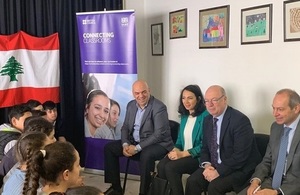Minister Burt: Our support to Lebanon will continue
Minister of State for the Middle East and International Development Alistair Burt visited Lebanon for two-days, where he reaffirmed the UK’s commitment to supporting a strong and prosperous Lebanon, while explaining the UK government’s decision to proscribe Hizballah in its entirety.

Minister Burt visiting a local school in Lebanon
Minister of State for the Middle East and International Development Alistair Burt visited Lebanon for two-days, where he reaffirmed the UK’s commitment to supporting a strong and prosperous Lebanon, while explaining the UK government’s decision to proscribe Hizballah in its entirety.
Minister Burt held a series of meetings with President Michel Aoun, Prime Minister Saad Hariri, Foreign Minister Gebran Bassil, Defence Minister Elias Bou Saab, Minister of Education Akram Chehayeb, Minister of Social Affairs Richard Kouyoumjian, and Director of General Security General Abbas Ibrahim.
Minister Burt visited a local school part of the joint DFID-British Council Connecting Classrooms programme, accompanied by Minister of Education Akram Chehayeb. With education remaining one of the UK’s key pillars, and in working towards the goal of reaching every child in Lebanon with education, the UK had committed up to £160 million to education in Lebanon from 2016-2021.
Minister Burt also met the UK – Lebanon Tech Hub team and heard from the team how the hub is providing support to Lebanese start-ups in both Lebanon and the UK.
Promoting a Balance for Better gender based world, Minister Burt attended International Women’s Day reception. Speaking about his visit Minister Burt said:
I am pleased to be back in Lebanon again. I am here to congratulate the new Lebanese government on its formation, and to reiterate the UK’s support for a strong, stable and prosperous Lebanon.
I came to Lebanon at an important time. Last week, the UK government proscribed Hizballah in its entirety. My government took this decision for the sole and simple reason that we can no longer judge there is any meaningful distinction between Hizballah’s military and political wings. To be clear, the decision is not about our commitment to Lebanon or the Lebanese, and I want our $200m per year of support to Lebanon to continue. But there should be no illusion about our deep concerns about Hizballah’s destabilising actions.
The economic relationship between the UK and Lebanon is growing stronger, and I look forward to more British companies investing and operating in Lebanon – a country that is very much open to business for the UK. In order to provide certainty and confidence to UK and Lebanese businesses, I hope we can agree immediately a UK-Lebanon bilateral trade agreement.
We look forward to rapid progress following from the commitments made at CEDRE in Paris now that a government has been formed. At the Lebanon-UK Business and Investment Forum in London last December, I announced an additional £30 million programme to support the Lebanese Government’s reform plans. Speedy implementation of this reform programme will be important to build momentum and unlock further international funding.
Many of my conversations during this trip will focus on the large number of Syrian refugees Lebanon generously hosts. Our policy is clear: we want Syrians to return, and we have no position on this other than ensuring they are safe, voluntary, and dignified, as verified by UNHCR. I welcome any initiative that helps achieve this.
Of course, while the great majority of Syrians want to return, the conditions in Syria, particularly on security, must improve. Whether it is the UN’s access inside Syria, conscription into the Syrian army, or the other important issues that affect refugees’ desire to return, ultimately establishing the right conditions for returns is only in the gift of the Regime in Damascus. In the meantime, we will continue our support for the Lebanese state, for vulnerable Lebanese and for the refugees themselves.
Finally, I am also pleased to be here on International Women’s Day and to meet with Lebanese women who have shaped and transformed their country and communities. They are an inspiration to us all.